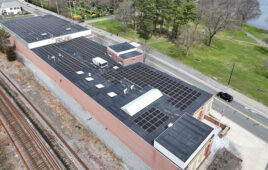Seventeen leading renewable energy CEOs are calling on President Biden to rescind the Trump Administration’s October 2020 solar proclamation, which improperly increased tariffs on solar panels and rescinds the exclusion for bifacial solar panels.
Led by the Solar Energy Industries Association (SEIA) and supported by the American Clean Power Association, the letter calls attention to the proclamation’s impact to existing solar contracts and discusses how harmful the Section 201 tariffs are to the U.S. economy and the industry’s ability to address climate change. Importantly, the CEOs are asking the President to return the tariffs to status quo and restore business certainty.
“Billions of dollars’ worth of solar contracts are now at risk because of the October 10 proclamation,” said Abigail Ross Hopper, president and CEO of the Solar Energy Industries Association (SEIA). “As we confront the numerous economic and climate challenges ahead, the President has the opportunity to build a clean energy economy with millions of well-paying jobs, strengthen our nation’s infrastructure, bolster domestic manufacturing, and uplift communities across America. Removing the tariffs are the first step to achieving this vision.”
The letter comes as clean energy companies continue to feel the effects of the tariffs. According to analysis from SEIA, the tariffs have led to a loss of 62,000 jobs, $19 billion in lost private sector investment, and a 26 million metric ton increase in carbon emissions.
“Our country has an industrious and determined solar workforce, from installers and operators to engineers and innovators, and every single one of them will benefit from the repeal of the last Administration’s proclamation which injected uncertainty into the marketplace,” said Heather Zichal, CEO of the American Clean Power Association. “Rolling back this proclamation will put Americans back to work, reviving manufacturing, and putting us on the pathway to an equitable recovery and a clean energy future.”
The clean energy industry and its partners remain committed to long-term policies that can boost domestic manufacturing, such as increased federal procurement opportunities for U.S. equipment manufacturers and tax credits to help incentivize private sector investments in domestic manufacturing.
SEIA and ACP will continue to work with the Biden administration, the next U.S. Trade Representative, and other organizations to put Americans back to work and create more opportunities for homegrown solar products.
News item from SEIA








Reversing these tariffs will go a long way in repairing our renewable energy infrastructure and restoring thousands of jobs. Hopefully this can get resolved quickly. We don’t have any time to lose.
The 201s go away in 2022, seems pointless right now. Module prices are in the mid 30s for 450-535w. There is no way Mission, First Solar, Helene and Silfab do not file on their own.
““Rolling back this proclamation will put Americans back to work, reviving manufacturing, and putting us on the pathway to an equitable recovery and a clean energy future.””
It’s pretty obvious the tariffs didn’t work, what seems to have happened it increased costs of panels, but also the cost of BOM items like the steel used in roof standoffs and racking made in other countries. Even with tariffs, Chinese panels are still the cheapest panels per watt retail in the U.S.. If one looks at what (has) happened, the two solar PV manufacturers in the U.S. that pushed for tariff protection are bankrupt. There were probably some 1,000 people that lost jobs in these manufacturing plants and yet, 62,000 solar PV installers and ancillary workforce personnel lost their jobs to protectionism that really didn’t work. China can still dump solar PV panels in America at $0.70/watt retail with tariffs, still cheaper than the $0.89 to $1.15/watt retail of U.S. made panels. Reviving manufacturing in China, not necessarily the U.S..
“The clean energy industry and its partners remain committed to long-term policies that can boost domestic manufacturing, such as increased federal procurement opportunities for U.S. equipment manufacturers and tax credits to help incentivize private sector investments in domestic manufacturing.”
You want the “private sector” to invest in domestic manufacturing, you will have to grow the business and keep costs lower or as low as the Chinese manufacturing equivalent. Using solar PV and wind generation to manufacture products would set the stage to go head to head with China’s 2025 policy and goal. The U.S. sorely needs a large battery manufacturing base with its own supply chain that doesn’t depend on another country’s materials and manufacturing to meet American needs. If one switches from oil and OPEC, it would be the same thing getting caught up with battery cells and packs being sourced outside the U.S. boarders. Any time someone does this, they risk the security of the nation to the suppliers of that nation.